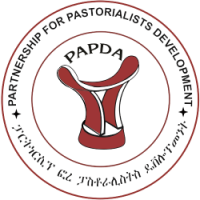- Success stories
- 2mins read
- 8 Views
Turning Challenges into Opportunities
For Mohammed Daked, a 65-year-old father of 11 children from two wives, feeding his large family in a drought-stricken region was a constant struggle. Farming had long been a challenge in his area due to poor soil conditions, and the meager harvests along the Gannale River bank barely met his family’s needs. His children’s education was also neglected, as Mohammed initially lacked awareness of its value. However, exposure to awareness campaigns by the government and stakeholders opened his eyes to the importance of education in shaping his children’s future.
A New Beginning through PAPDA’s Integrated Livelihood Development Project
Mohammed’s life took a positive turn when PAPDA launched its Integrated Livelihood Development Project in his community. Identified as an ideal beneficiary through a rigorous selection process in collaboration with the Women and Children Affairs office, Mohammed joined a vegetable production initiative designed to uplift households through improved agricultural practices.
He and other beneficiaries first underwent training on modern farming techniques, preparing them to tackle the challenges of growing crops in their environment. With seeds, farming tools, and expert advice provided by PAPDA, the group began cultivating a variety of vegetables such as onions, cabbages, and green peppers. Over the course of the project, Mohammed’s group successfully harvested and sold produce in the local markets, generating a net profit of 62,500 ETB per person.
PAPDA also encouraged the group to diversify by introducing banana cultivation and crop farming (wheat and maize) along the fertile Gannale River bank, maximizing the use of land that could support agriculture.
Expanding Opportunities: From Vegetables to Livestock
Inspired by his success in vegetable farming, Mohammed reinvested his profits into goat rearing, purchasing 15 goats. Through careful management, the herd grew rapidly, and Mohammed now owns 60 goats. This expansion has not only improved his family’s food security but also strengthened his asset base.
Vision for the Future
Mohammed’s entrepreneurial spirit remains strong. With plans to sell some goats and open a shop, he hopes to trade in consumer goods and further diversify his income streams. If his financial situation continues to improve, he also dreams of building a new house for his family.
“I am truly satisfied with how far I’ve come, thanks to PAPDA’s support. This project has changed our lives. We are no longer just surviving—we are thriving. I am grateful for PAPDA’s commitment to improving our livelihoods through vegetable farming,” Mohammed shared.
Looking ahead, Mohammed and his group are determined to expand their vegetable production initiative, taking it to new heights and ensuring sustainable income for their families.
Conclusion
Mohammed Daked’s story is a testament to the power of targeted interventions in transforming livelihoods. PAPDA’s integrated approach—combining skill-building, agricultural support, and market access—has empowered Mohammed to overcome the challenges of food insecurity and asset poverty. His success not only provides financial stability for his family but also serves as a model for other community members seeking sustainable paths out of poverty.
Through innovative projects like these, PAPDA continues to foster resilience, enhance food security, and inspire individuals to build better futures for themselves and their communities.



